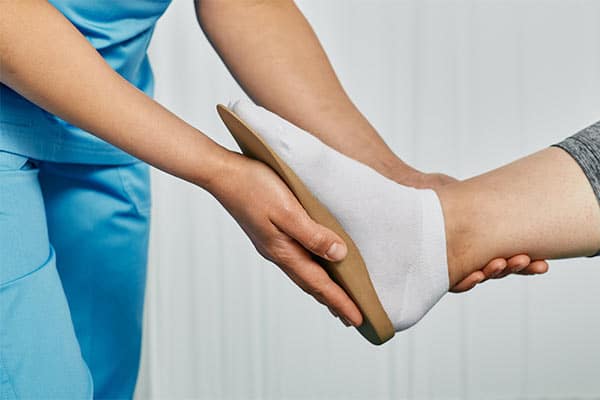Plantar fasciitis can be extremely painful. The millions of people who suffer from the foot condition know how difficult walking can be when you have it, especially first thing in the morning.i
If you go to a podiatrist, it’s likely you’ll be prescribed expensive, custom-made orthotic shoe inserts.
But a new study shows they are probably a waste of money.ii
Researchers found that pricey custom inserts don’t work any better than inexpensive, over-the-counter ones.
Plantar fasciitis causes stabbing pain on the bottom of your feet near the heel. It’s due to irritation in the fibrous band of tissue that runs from the heel to the base of the toes.
The American Orthopedic Foot and Ankle Society says people who put a lot of “wear and tear” on their feet are more prone to the condition.iii
That includes runners and people who work on their feet, especially without supportive shoes. People who are obese, or who have high arches or flat feet are also at higher risk.
Musculoskeletal researcher Nadine Rasenberg of the Erasmus Medical Center in Rotterdam, the Netherlands, led the review.
“In studies, it does not seem to matter whether patients were treated with expensive orthoses or over-the-counter orthoses,” she said.
The evidence shows that pricey shoe inserts sold by podiatrists—called orthoses–offer no advantage over ones you can get at a drug store for a fraction of the price, Rasenberg said. Her study was published in the British Journal of Sports Medicine.
Don’t Foot the Bill for Pricey Orthotic Shoe Inserts
Dr. Keith Wapner is a foot and ankle specialist who was not involved in the study. He’s chief of foot and ankle orthopedic surgery at Penn Medicine in Philadelphia.
“There is no reason to spend $300 to $500 on custom orthotics for plantar fasciitis,” he said. “Unfortunately, this has become a cash cow for some providers.”
If your doctor persuades you to buy the expensive shoe inserts from him or her, you’ll be the one footing the bill. Health insurance companies won’t cover them.
Off-the-rack orthotics cost as little as $15. And they are widely available at drug stores and online.
Dr. Wapner also recommends another solution…
Plantar fasciitis involves tightness in the calf muscle. So proper stretching is key to dealing with the condition, he said.
Some patients benefit from a “night splint.” They are widely available online and cost about $20.
Because people generally sleep with their foot pointed, the calf is contracted all night. This is why plantar fasciitis sufferers often have the worst pain when they wake up in the morning. The first few steps of the day can be excruciating.
A night splint keeps the foot flexed during sleep, which stretches the calf and the tissue at the heel, Dr. Wapner said.
4 Steps to Plantar Fasciitis Relief
This simple exercise also works for many people:iv
Step 1: Find a step or sturdy box and a small towel.
Step 2: Stand barefoot on the affected leg with the ball of your foot on the step or box. Your heel will extend over the edge. Roll a small towel and place it beneath your toes.
Step 3: Your unaffected leg should hang loosely down, bent at the knee.
Step 4: Raise your heel slowly for three seconds and hold it for two seconds. Lower your heel slowly for three seconds and hold it for two seconds.
Repeat the sequence eight-12 times, every other day. Once you can do 12 repetitions easily, wear a backpack filled with books to add weight and make the exercise more challenging. Here’s an illustrated guide to the exercise.
If you’re suffering from plantar fasciitis, don’t let a podiatrist pad his or her profits at your expense. Try these less expensive (and more effective) options.
Editor’s Note: Can CBD or medical marijuana relieve your chronic pain? You won’t get straight answers from the mainstream media… Read Independent Healing to learn which conditions cannabis-based remedies can effectively treat, and which ones they can’t.
Related Articles
The Pandemic Makes Chronic Pain Worse…Here’s Help
Your Feet May Reveal If You Have Coronavirus, New Research Suggests

